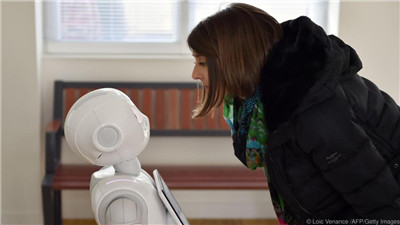凯利·费舍尔(Kelly Fisher)一年半以前开始使用机器人顾问,因为她认为这种方式比通过人类顾问进行投资更方便、更容易。但出乎她意料之外的是,她对这种机器人的信任度远超坐在桌子对面那些活生生的同类。
Kelly Fisher started using a robo-advisor ayear and a half ago because she thought it would be more convenient and easierthan investing through a human advisor. What she didn’t anticipate, though, wasjust how much more truthful she would be with an automaton rather than aliving, breathing person sitting across the desk.
这位家住旧金山的零售业高管通过机器人顾问创建了一个8,000美元的投资账户。这其实就是一些网站,它们会询问一系列问题,然后提供与投资者的风险承受能力和生活方式相匹配的基金。费舍尔之所以使用这些网站,并不是因为她有什么见不得人的地方。但她表示,对他人进行评判是人性使然,而向一个人类财务专家敞开心扉会让她感觉不舒服。而面对机器人顾问时,费舍尔会更加诚实地透露自己的财务状况。
When someone starts asking me about my networth, I get uncomfortable. With a robo-advisor there’s nojudgement.
当有人开始向我询问净资产时,我就会感觉不舒服。但机器人顾问就不会对此作出任何评判。
The San Francisco-based retail executivehas about $8,000 invested in accounts with robo-advisors. These are sites thatask a series of questions and then they match a fund with that investor’s risktolerance and lifestyle. Fisher doesn’t have anything to hide by using thesewebsites, but she says it’s human nature to judge, and that’s made ituncomfortable for her to open up to a human financial expert. With arobo-advisor, Fisher can be more honest about where she stands financially.
“当有人开始向我询问净资产时,我就会感觉不舒服。”费舍尔说,“机器人顾问肯定不会对此作出任何评判。无论是背负债务,还是想要花钱度假,抑或希望大发横财,我在它们面前都不会感觉耻辱。”
“When someone starts asking me about my net worth, that’s when I getuncomfortable,” Fisher said. “With a robo-advisor there’s definitely nojudgment. There’s no stigma over having… debt or deciding that you want tospend money on a vacation or about coming into a windfall.”
费舍尔在电脑面前的这种放松状态并非个例——有越来越多的研究表明,与人类相比,我们更加信任机器人和自动化的在线表格。除了成本外,这正是机器人顾问有可能成为个人首选投资方式的重要原因——到2020年,这类服务管理的资产有望达到2.2万亿美元,远高于目前的500亿美元。
Fisher’s comfort with a computer isn’tunusual – there’s a growing body of research showing that people trust robotsand automated online forms more than humans. That’s one big reason, beyondlower costs, why robo-advice – which is expected to have a staggering $2.2trillion in assets under management by 2020, up from $50bn today –may becomethe preferred way for individuals to invest.
得州达拉斯的盖尔·卢卡斯(Gale Lucas)多年以来一直在研究人类对机器人的信任感。作为Organizational Wellness and Learning Systems的研究总监,她发现人们在向电脑披露信息时的确展现出更强的信任感。这不仅涉及普通问题,也包括更加隐私的信息。
Gale Lucas, director of research at Dallas,Texas-based Organizational Wellness and Learning Systems, has been studyingrobot-human trust for years. She’s found that people really are more truthfulwhen they disclose information to a computer. That goes for both generalquestions as well as more intimate details.
她在2014年的一篇论文中写道,“在涉及违法、不道德或有违文化传统的信息时,这种诚实回答的现象尤其明显。”
The effect on higher rates of “honestresponding…are especially strong when the information is illegal, unethical,or culturally stigmatised,”she wrote in a 2014 paper.
人们更容易对自动化工具吐露心声,是因为他们认为电脑不会对自己作出评判,并且认为电脑比人类更有道德。
People are more open with automated toolsbecause they believe computers don’t judge and thatthey’re more ethical.
卢卡斯解释道,财务问题属于后一类。例如,人们会对负债持有负面观点。人们讨论这类问题时感觉不舒服,甚至有可能向人类财务顾问隐瞒自己的负债金额。
Finances would fall into that lattercategory, Lucas explained. Debt, for instance, has a negative connotationattached to it. People feel uncomfortable discussing it and may even hide howmuch they really owe from a human financial advisor.
“他们感觉非常尴尬,不想承认自己的信用卡有多少负债。”卢卡斯说,“这会产生焦虑,所以必须要找到一个让你愿意向其吐露心声的人。你愿意告诉这个人,你很担心自己可能永远还不清这些债务。”
“They’re very embarrassed and don’t want to admit how much creditcard debt they have,” Lucas said. “It’s anxiety producing, so to have someoneyou can talk to where it’s safe to say that you’re worried that you’ll neverget out from all of that debt is important.”
